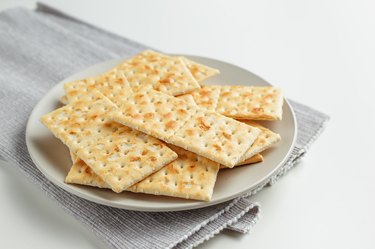
When you get that telltale burning feeling after a meal, or maybe it's an acid taste at the back of your throat, you may reach for saltine crackers in hopes they'll bring relief. But is it a folk remedy or a medical fact that saltines can help you feel better?
Read more: Are Saltine Crackers Healthy?
Video of the Day
Video of the Day
The Lowdown on Saltines
"Yes, that is true; they can neutralize acid," says C. Prakash Gyawali, MD, a gastroenterology professor at Washington University School of Medicine in St. Louis. "Actually, eating anything can neutralize acid, but crackers have been noted to reduce the burning sensation."
According to the Cleveland Clinic, the burning check discomfort that people describe as heartburn is often caused by stomach acid backing up in the esophagus. Doctors refer to this as acid reflux. If you have it often, your doctor may diagnose you with a condition called gastroesophageal reflux disease (GERD).
Pass on the Butter
While crackers can neutralize the acid that's causing your symptoms, "you probably shouldn't put butter or anything on them," says Dr. Gyawali. "Just eat them plain." That's because eating foods high in fat can trigger acid reflux. Butter or margarine may counteract the crackers and make your symptoms worse.
Does it matter if the crackers are salted or unsalted? "Probably not," says Dr. Gyawali.
Other Foods That Help Heartburn
If you don't have crackers on hand, a few sips of water can help, as can milk. "Milk is alkaline, so it can neutralize and dilute the acid," says Dr. Gyawali. However, you want to avoid anything that contains lots of fat so opt for skim or low-fat milk instead of whole milk.
"Bananas, melon — these are other food items that can reduce the acid burden," says Dr. Gyawali. "Bananas in particular."
The fastest way to relieve heartburn, though, is to take an over-the-counter antacid. Liquid antacids get to work quickest.
Foods to Avoid
Some foods are known to trigger acid reflux. To prevent heartburn, the American Gastroenterological Association recommends avoiding:
- Fatty or fried foods
- Chocolate
- Alcohol
- Coffee
- Citrus fruits or juices
- Tomatoes or foods that contain them
- Carbonated beverages
Strategies for Managing Acid Reflux
Beyond diet, there are lifestyle changes you can make to reduce your chances of suffering heartburn, according to the Mayo Clinic and the American Gastroenterological Association. For instance:
- Eat smaller meals. Overeating can cause acid reflux.
- Lose weight if you're overweight. The extra pressure on your stomach can cause its contents to back up into your esophagus.
- Quit smoking. Smoking can weaken the muscular valve at the bottom of your esophagus that controls the opening to your stomach.
- Don't eat right before bedtime. Give your stomach a few hours to digest before you lie down.
- Avoid tight-fitting clothes. Garments that put pressure on your stomach, such as control-top pantyhose and shapewear, can contribute to heartburn.
- Avoid aspirin and other anti-inflammatory pain relievers. Try acetaminophen instead.
Some prescription medications may also contribute to heartburn. According to the U.S. National Library of Medicine, these include some types of medications for:
- Blood pressure (beta-blockers and calcium-channel blockers)
- Birth control (progestin)
- Depression (tricyclic antidepressants)
- Sea-sickness (anticholinergics)
- Sleep problems or insomnia (sedatives)
- Parkinson's disease (dopamine-like medications)
- Asthma or other lung diseases (theophylline)
If you have frequent heartburn and you take any of these medications, talk with your doctor to see if it might be contributing to your symptoms. Don't stop taking your medication or change the way you take it without talking with your doctor.
Heartburn vs. Heart Attack
How can you tell if your chest pain is just heartburn or something more serious involving your heart? Signs that it might be more than heartburn include shortness of breath, sweating, lightheadedness or dizziness and chest pain that spreads to your neck, jaw or back, according to the Mayo Clinic.
But not all heart attacks involve these typical symptoms, so if you have persistent chest pain and you don't know whether or not it's heartburn, it's best to err on the side of caution. Call 911 or seek emergency medical help.
- American Gastroenterological Association: "Gastroesophageal Reflux Disease (GERD):Treatment"
- U.S. National Library of Medicine: "Heartburn"
- Cleveland Clinic: "Heartburn Overview: Prevention"
- Mayo Clinic: "Heartburn"
- Mayo Clinic: "Heartburn or Heart Attack: When to Worry"
- C. Prakash Gyawali, MD, gastroenterology professor, Washington University School of Medicine, St. Louis
Is this an emergency? If you are experiencing serious medical symptoms, please see the National Library of Medicine’s list of signs you need emergency medical attention or call 911.